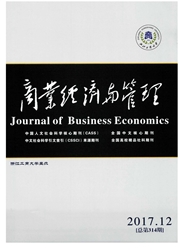

 中文摘要:
中文摘要:
通过比较不同形式的合约分析剩余控制权存在条件,探讨特定控制权与剩余控制权之间的转化关系;结合古典边际分析框架考察生产函数中的资本与代表人力资本的剩余控制权的边际产出,将剩余控制权收益从公司绩效中分离出来;最后,引入奈特的保险机制研究剩余控制权对应的剩余索取权在公司中的转移特征,并研究公司剩余控制权的定价问题。研究发现:(1)信息不完全与谋取经济利润目的同时存在才可能形成剩余控制权;(2)剩余控制权依赖于特定控制权的界定并在其行使过程中持续向特定控制权转化,并通过委托-代理关系形成完整的剩余控制权转移结构;(3)剩余控制权转移结构决定了公司的人力资本特征,对公司绩效的影响可通过人力资本在公司生产函数中的边际产出来刻度;(4)由于人力资本的不可质押性,剩余控制权收益一定为正。
 英文摘要:
英文摘要:
By comparing different forms of contracts we analyzed the conditions on which residual control rights come into existence and the transformation relations between particular control rights and residual control rights. Under the framework of classical marginal analysis, we examined the marginal output of capital in the production function and that of residual control rights which indicates human capital. Gains from residual control rights were separated from corporation performance. Then, by introducing insurance mechanisms raised by Knight, we studied the characteristics of a correspondence to residual control rights, namely, residual claim rights, during the transfer in the corporation. The pricing of residual control rights for a corporation was further examined in the end. The main conclusions are as follows: ( 1 )Residual control rights come into existence only when incomplete information and the pursuit of profit appear simultaneously; (2)Residual control rights depend on defining particular control rights , constantly transforming them into particular control rights during execution, and forming a complete transfer structure of residual control rights through principal-agency relationship; (3)The transfer structure of residual control rights determines the characteristics of corporation's human capital, and the effect of residual control rights on corporation performance can be scaled by the marginal output of human capital in corporation's production function. (4)Due to the fact that human capital is free of pledge, corporation's gains from residual control rights must be positive in value.
 同期刊论文项目
同期刊论文项目
 同项目期刊论文
同项目期刊论文
 期刊信息
期刊信息
